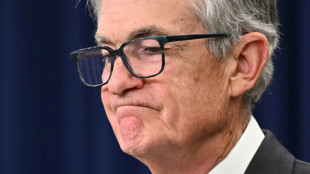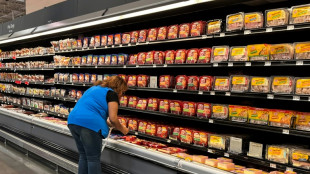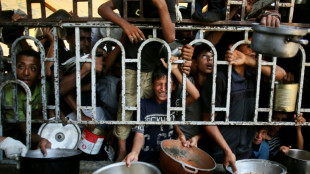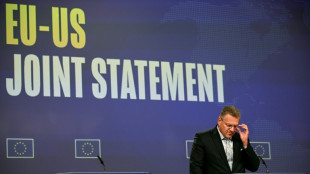Protests mark buildup to Eurovision semi-final
The 16 competitors in the Eurovision Song Contest's second semi-final went through a last dress rehearsal marked by protests Thursday ahead of a show when six of them will crash out.
Israel's participation in Eurovision 2025 has drawn protests over the Gaza war, but its competitor, Yuval Raphael is tipped to qualify for Saturday's final.
Raphael survived the October 7, 2023 attack on Israel that sparked the Gaza war, hiding beneath bodies as Hamas gunmen attacked a music festival, killing hundreds.
The 24-year-old, with her song "New Day Will Rise", is bidding for one of 10 remaining spots in the final, when 160 million to 200 million people are expected to watch the world's biggest live television music event.
At the dress rehearsal, held in front of 6,500 Eurovision fans at the St. Jakobshalle arena, demonstrators made a disturbance during Raphael's performance and were ejected.
"Six people, including a family, disrupted the rehearsal with oversized flags and whistles. Security personnel were able to quickly identify those involved and escort them out of the hall," Swiss Broacasting Corporation, the Eurovision 2025 host broadcaster, said in a statement.
"The organisers are committed to a neutral, safe, inclusive and respectful environment at the ESC," they added.
Based on the performances in Thursday's broadcast show, which starts at 1900 GMT, viewers across Europe and beyond will decide who goes through to the final.
Bookmakers have Israel, Austria and Finland's entrants as their favourites to progress, alongside contestants from Malta, Australia and Lithuania.
- Protests and leopard print -
As Israel ramps up its war in Gaza, calls have mounted for it to be excluded from Eurovision -- including from the Swiss reigning champion, Nemo.
Some participating broadcasters have called for a discussion on Israel's involvement.
Outside the arena, dozens of protesters milled about on Thursday with Palestinian flags on their shoulders.
One wore a flag reading "stop genocide", while another shouted: "Stop killing children".
Elsewhere in Basel, dozens of people attended a rally in support of Raphael, waving large Israeli flags.
Some armed police were on duty outside the arena. But both police and protesters were outnumbered by Eurovision fans, dressed to the nines in leopard print, sequinned dresses and even hot-pink zebra stripes.
They carried Danish, Finnish, Maltese and Israeli flags, while one woman wore a headband decorated with the flags of every competing country.
- Heartache, milkshakes and lust -
At Thursday's show, Austria's JJ will perform "Wasted Love", a song combining operatic vocals and modern beats, echoing the style of Nemo's winning tune last year.
"My song is about my personal experience with wasted and unreciprocated love," he told AFP.
"My message is to stay strong and you'll get out of any situation, no matter how tough it is. There's always a light at the end of the tunnel."
Eurovision has a big following in Australia, and the country has competed since 2015.
Australian social media powerhouse Go-Jo opens Thursday's show with "Milkshake Man".
The performance features innuendo, 1970s glam vibes, a giant blender and a knee slide.
"I'm very ready and I couldn't be more confident," he told AFP.
Finland's Erika Vikman closes Thursday's concert with "Ich Komme", a leather-clad song about falling into the trance of lust.
- Lips and glitterball -
Malta's Miriana Conte's performance of "Serving" features a giant pair of lips and a glitterball.
The 24-year-old said she wanted to send a message of support to the trans community.
"It's very sad to be born in a world where you are not allowed to be yourself," she told AFP.
"I'm very outspoken as a person and I carry this responsibility with a lot of heart."
Twenty-six countries will take part in Saturday's final.
Comedy trio KAJ -- from Finland but representing Sweden -- are making their competitors sweat with their song "Bara Bada Bastu", about the joys of having a sauna.
They came through Tuesday's first semi-final, as did Estonia's Tommy Cash with his Italian-accented "Espresso Macchiato" and Poland's Justyna Steczkowska.
M.Michel--PS

 London
London

 Manchester
Manchester
 Glasgow
Glasgow
 Dublin
Dublin
 Belfast
Belfast
 Washington
Washington
 Denver
Denver
 Atlanta
Atlanta
 Dallas
Dallas
 Houston Texas
Houston Texas
 New Orleans
New Orleans
 El Paso
El Paso
 Phoenix
Phoenix
 Los Angeles
Los Angeles



